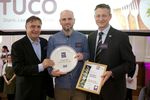Top marks for Plymouth and Manchester universities at Food Made Good Awards
23rd March 2016
Plymouth University and The University of Manchester both triumphed at the Food Made Good Awards on 22 March, in recognition of their outstandingly sustainable catering.
Raymond Blanc OBE presented Plymouth University with the Food Made Good University Champion award (sponsored by TUCO) at a gala lunch, hosted by the awards’ organisers, the Sustainable Restaurant Association (SRA). The accolade is awarded to the university catering department judged to be the most sustainable in the UK.
Seasonal fish, locally sourced free-range eggs and RSPCA Assured charcuterie exemplify the carefully sourced ingredients on its regularly changing menus which give a strong nod to healthy eating. The university’s long-standing record of employing apprentices and educating local school children about food, also contributed to its award winning performance.
University of Cork (KSG), and Durham University were runners-up in this category. Students and staff at Cork can enjoy home-grown herbs and vegetables while Durham overcame the challenge of working with small local producers by linking them all together through one large supplier.
This is the fifth time the SRA has presented the industry awards, sponsored by Nestlé Professional, celebrating everything exciting about British hospitality businesses, chefs and suppliers doing the extraordinary to make food good – delicious, ethical and sustainable – but the first time there has been an award for universities.
Mark Linehan, Managing Director of the SRA, said: “With more than 30 universities signed up to the Food Made Good Programme over the last two years, it’s clear that the sector is putting sustainability at the heart of its menus and competition for this award was very strong.”
FoodInResidence, The University of Manchester, won the Best Food Waste Strategy Award (sponsored by Unilever Food Solutions) open to all foodservice businesses. Having established students’ appetite for action; it implemented wholesale changes to its catering operation – removing trays, reducing portion sizes and requiring students to scrape off their leftovers. The results; a quarter less plate waste and almost seven tonnes less total food waste.
Poco, the East London tapas restaurant that prides itself on serving affordable food made with the country’s finest ingredients, was named Food Made Good Restaurant of the Year, just six months after opening.
Lemons are the only imported fresh ingredients on the menu infused with Tom’s root to fruit philosophy. Dishes like beetroot hummus paired with crisp fried beet leaves, trout smoked in house with shavings from the English Oak that made the tables and Pavlova made with rhubarb curd using the yolks left from making the meringue illustrate Poco’s ethos.
Jamie Oliver was this year’s recipient of the Raymond Blanc Sustainability Hero Award for his “unrelenting passion and commitment” to use food as a force for good and to improve the health of the nation.
Raymond said: “Whether Jamie is challenging school caterers head-on, here or in the USA, or throwing himself into campaigns with an unrelenting passion and commitment to persuade the nation to buy higher welfare chicken, he carries people with him, leading them to a better place.”
Meanwhile, Lussmanns Fish & Grill received the People’s Favourite Award after topping a poll of five restaurants shortlisted from more than 600 nominations. The Hertfordshire restaurant earned huge public backing for its heady cocktail of community engagement – supporting more than 30 good causes – and menus that feature immaculately sourced meat and fish from British producers.
Founder Andrei Lussmann said: “We are humbled to receive such an endorsement. It’s a seal of approval and a demand for ‘more of the same please’ that will spur us on to continue providing a sustainable option on the high street.”
Hugh Fearnley-Whittingstall’s River Cottage HQ fought off fierce competition to land the Food Made Good Award for Sourcing for the fourth year running, helped by half the ingredients being grown or reared on site and a wine list that’s exclusively either English, organic, biodynamic or natural.
South London pub The Roebuck, picked up the award for Most Improved Sustainability in recognition of the fact that, where previously about half of the fruit and veg was locally sourced, and the same proportion of meat free range – now customers can enjoy these standards all of the time.
Thomasina Miers’ popular Mexican restaurant group Wahaca, recently recognised as being Carbon Neutral, was named the Food Made Good Large Group of the Year.
Christian Puglisi, chef and founder of Relæ, collected the International Food Made Good Champion award on behalf of the Copenhagen restaurant which is the world’s only certified organic Michelin starred restaurant.
The Food Made Good Awards are run by the Sustainable Restaurant Association to celebrate everything exciting about British hospitality businesses, chefs and suppliers doing the extraordinary to make food good – delicious, ethical, sustainable.
All but four of the awards are decided on the basis of the scores achieved in the Food Made Good rating during 2015. This assesses restaurants across the three pillars of sustainability; Sourcing, Society and Environment and the awards recognise the achievements of the very best sustainable foodservice businesses in the UK and globally.
Food Made Good is run by The Sustainable Restaurant Association to allow food lovers to indulge their passion for dining out without having to check their principles in at the cloakroom. Restaurants, cafés and caterers are assessed on their sourcing, impact on society and environmental footprint and diners can then find out their star rating, dubbed “The Michelin Stars of Sustainability” by The Sunday Times, using the Food Made Good Diners’ Guide
www.foodmadegood.org
The full winners list can be found below.






 Except where otherwise stated, content on this site is
licensed under a Creative Commons Attribution 3.0 License.
Except where otherwise stated, content on this site is
licensed under a Creative Commons Attribution 3.0 License.
